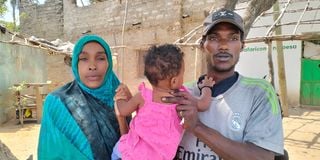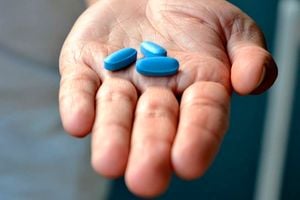
Ms Khadija Mohamed Shebwana and Mr Babli Shee Athman with their baby Halima in Lamu Town.
Three years ago, you would see Khadija Mohamed Shebwana, 32, and Babli Shee Athman, 28, walking on the streets of Lamu Old Town as a pair.
The two lovebirds would be seen holding hands tightly, an indication of romance whatsoever the situation they have been in.
Khadija and Shee are recovering drug addicts, having wasted at least 15 years of their lifetime abusing drugs, particularly heroin, cocaine and bhang.
But their salvation came in the form of a residential treatment centre at the Lamu King Fahd County Hospital in 2021.
Here, the Medically Assisted Therapy (Mat) Clinic's key objective is to rehabilitate drug addicts by administering methadone, a narcotic pain reliever that’s taken orally. Counselling services are also offered.
It was while confined at the centre that the embers of love first sparked and interestingly, greatly helped shape their lives.
Walking as three lovebirds
Four years down the line, the two are now walking as three lovebirds. They have gone to an extent of bearing children. They are now blessed with a baby girl, who is now eight months old.
During an interview with Nation.Africa, Khadija and Shee jovially stated that welcoming their baby eight months ago has significantly tightened their love that was found and blossomed in a hopeless place.
Shee says they are now concentrating more on parenting rather than thinking about anything like drugs. He says parenting has made them soberer and looking at life positively unlike before.
“We’re happy to have recovered from drugs. It’s almost the fourth year living free of heroin and cocaine. I love my wife. She loves me too. In order to cement this love that we found in a methadone clinic, we opted to get a child. This has made us more sober. We’re now soldiering on without any thoughts of relapse whatsoever,” said Mr Shee.
“Parenting isn’t easy. And that’s why it has kept us busier to an extent that our minds can't think about indulging in any drugs anymore,” he added.
Khadija on her part, says looking at Baby Halima every time gives her hope and the positive energy about life in general.
She insists the choice they made four years ago to quit drug addiction was the right one as it has helped avert many negativities in their lives.
According to Khadija, many people in society, including relatives and even siblings used to hate them just because of their addiction.
Today, that has completely changed. Everyone is now surrounding them, laughing with them and playing with their baby.
Khadija insists they are now viewed as human beings unlike before where people used to treat and judge them harshly like stray dogs.
She says during their years while battling addiction, they would often find it difficult to separate reality from fantasy. However, since they chose the right path, their lives have been reshaped.
“Drugs are bad. We would reach a point of selling our clothes and use the proceeds to buy sachets of heroin, cocaine, bhang or any hard drugs coming our way but we’re happy now. We fell in love with each other and that blossomed into a full marriage. Today, we’re even happier holding our bundle of joy-Baby Halima,” said Ms Khadija.
“Every time I think about stealing or being convinced to take drugs, I look at my child. I am aware if I consume drugs, they can even affect the baby, so I switch my mind off drugs. Parenting has pushed us to look at life more seriously and keenly,” she added.
Fully recovered from drugs
The two insist as of now, there is nothing that they have not seen or done because of drugs.
“That’s why we decided to change our lives for the better. We would be dead if we continued with our old ways but now, life is fruitful, positive and interesting. Playing with and raising our child is good. We’re looking forward to getting more children in coming years,” said Ms Khadija.
The two, however, are still struggling to make ends meet as they depend on menial jobs which are unreliable.
They appealed to the government and well-wishers to consider supporting people who have successfully quit drug addiction to get back to their feet.
“We consider ourselves as people who have fully recovered from drugs. We’re concentrating on parenting and a positive life and nothing else. We want to be a role model to the society of drug users that they can still reform if they have the zeal and determination,” said Shee.
“My worry is on how we will sustain our lives as a couple and parents of this young angel of ours. We have no job. The lack of employment might force us to turn to drugs again and we don’t want to. We need help,” he added.
Their advice to other drug users out there is that overcoming addiction is not an easy task and needs one to be serious before making such a hard decision.
“You need to be serious since you’ll be required to be choosy even with the kind of friends to have. You’ve to stop going to places that you previously frequented. That alone is enough rehabilitation. We even changed our way of thinking and perception about the world. Yes, you can,” stresses Khadija.
Residents of Lamu Island interviewed by Nation.Africa expressed their joy of seeing Khadija, Shee and baby Halima walking freely and mingling with them.
Ahmed Alwy, a neighbour, says before the two changed their way of life, many did not want to see them near their compounds.
“Many feared seeing Khadija and Shee around their compounds thinking they would steal from them. But today, we’re happy. In fact, many want to be around the couple and their fascinating baby. They’re good people,” says Mr Alwy.
Fatma Bakari, a resident, says Khadija and Shee are a symbol of hope to the hopeless.
Alcohol and drug abuse
“Their life indeed portrays both love, resilience, zeal, determination, dedication and responsibility in equal measure. We love them. People can still choose the right path no matter what. Never say it’s late. You can still change and tread the right path to life,” said Ms Bakari.
The National Authority for the Campaign Against Alcohol and Drug Abuse (Nacada), in its Biannual report on the status of alcohol and drug abuse control in Kenya stated that abuse of hard drugs has in recent years expanded beyond the traditional major trafficking zones of Coastal counties and Nairobi.
The report that was presented to the National Assembly and the Senate in November 2024 shows that nationally, illicit alcohol continued to account for the highest seizures by authorities followed by cannabis, heroin, cocaine, methamphetamine and MDMA (ecstasy).
The data further showed that counties in Western, Nairobi, Rift Valley and Nyanza region were the most affected in terms of illicit alcohol seizures.
According to a survey conducted by Nacada in 2022 in collaboration with the Kenya National Bureau of Statistics and the Tobacco Control Board, 17.5 percent, which translates to 4,733,135 of Kenyans aged 15 to 65 years, were using at least one drug or substance of abuse.
The survey further indicated that 11.8 per cent (3,293,495) of Kenyans within the same age bracket were using alcohol; 8.5 per cent (2,305,929) were using tobacco and 1.9 per cent (518,807) were using cannabis.
On the other hand, 0.2 per cent, which translates to 60,407 of Kenyans aged between 15 to 65 years, were using prescription drugs.
The survey also showed 9.7 per cent (2,613,735) of Kenyans aged between 15 to 65 years had alcohol use disorders, 6.8 per cent (1,846,868) had tobacco use disorders, 1.6 per cent (431,640) had cannabis use disorders, 0.2 per cent (42,579) had prescription drug use disorders.
The report further indicated that high risk counties for heroin include Nairobi, Mombasa, Kilifi, Kwale, Lamu, Tana River, Taita Taveta, Nyeri, Murang'a, Kiambu, Kirinyaga, Machakos, Laikipia, Nakuru, Isiolo, Uasin Gishu, Kisumu, Busia and Marsabit.
On the other hand, an analysis of facility data for persons with substance use disorders in Kenya as per the report reveals a youthful median age of 24 years as among clients admitted for addiction treatment and rehabilitation services related to cannabis.
According to Nacada, inadequate aftercare and reintegration of persons quitting drugs into the society is still a challenge that leads them to relapse.
The agency recommended that emphasis should be placed on aftercare and reintegration programs as a good practice towards relapse prevention.











